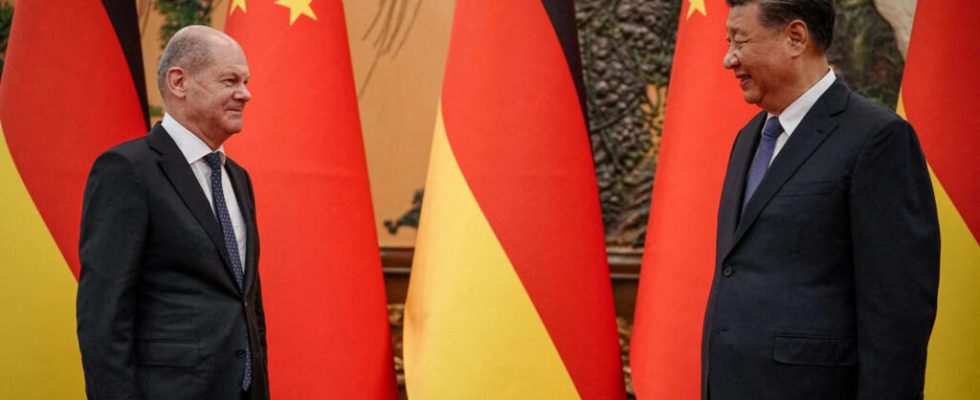German Chancellor begins three-day visit to China. Olaf Scholz arrives in Chongqing, in southwest China, with a large delegation of German participants this weekend of April 13-14. A visit where bilateral issues will be discussed, but also trade tensions between Beijing and the West regarding Chinese subsidies to industry.
4 mins
From our correspondent in Beijing,
Three days, three cities – Chongqing, Shanghai and Beijing – and three ministers – those of Agriculture, Environment and Transport –… The size of the German delegation and the duration of this state visit are commensurate with the challenge . Olaf Scholz intends to re-engage the relationship between the two countries. He took with him the CEOs of Siemens, Mercedes, Bayer, BMW and other heavyweights of the German economy.
A very business-oriented trip, notes AFP, starting with a visit to the Bosch Hydrogen Power System site, in the megalopolis of southwest China and its 32 million inhabitants perched on the Yangtze River. The chancellor is also expected to visit a factory in Shanghai, knowing that for almost five decades, Germany has been the largest trading partner of the China in Europe.
Trade between the two countries represents a third of total trade China-Europe. A third of European investments in China are German. And since 2016, China has been Germany’s largest trading partner. This strength, but also this dependence of German companies on the Chinese market, means that Olaf Scholz wanted to be among the first Western leaders to return to a China still under zero Covid in 2022.
And for the Chinese, Berlin is seen as the most hesitant capital regarding the sanctions decided by Brussels against electric cars, solar panels and now wind turbines. made in China. Germany plays an exceptional role for China in the development of its economy as well as in its foreign trade relations. While countries like the United States and Japan are positioning themselves much more clearly towards China, Germany remains a key and relatively open access point to the technology.
De-risk without creasing
This particular role of Germany in the European Union (EU) will be at the heart of discussions with Xi Jinping and Prime Minister Li Qiang on Tuesday April 16 in Beijing, where it will also be a question of asking China to reduce industrial overcapacity which is killing jobs in Europe, at a time when the Chinese government is desperately trying to attract foreign investors back. So give and take, even if, for the moment, we are far from the mark.
According to a study by the Kiel Institute published before the visit, aid paid by the Chinese state to businesses is three to nine times higher than that of countries like Germany or the United States. Olaf Scholz will therefore have to work to de-risk the Sino-German relationship, according to the strategy initiated in July 2023 by Berlin. This without risking offending Beijing, notes the Reuters agency. A balancing act, while according to a study published before the visit, almost two thirds of German companies in China feel discriminated against and are demanding better access to the Chinese market.
“ Almost a year after the publication of Germany’s China strategy, there appears to be an increased focus on the positive and proven bilateral agenda, which has generated significant economic benefits for both sides. However, economic realities in China have changed to the detriment of the German economy. This is reflected in the fact that the share of German exports to China has fallen back to the 2014 level. “, says Nis Grünberg, senior analyst at the Mercator Institute of Studies on China.
Dialogue of the deaf on Ukraine
On the international level, Olaf Scholz should take up the elements of language broadcast by European leaders each time they pass through Beijing, namely that China has influence over its Russian ally and that it should use it to end the war in Ukraine. A message which, for the moment, has fallen on deaf ears, knowing that Chinese diplomacy has still not condemned Russia’s attack on Ukraine and promised again last week to Sergei Lavrov to strengthen cooperation with Moscow.
During his previous visit where he had spent 11:00 in Beijing, the German chancellor boasted of having pushed the Chinese president to tell Russia not to use nuclear weapons. This time again, Chinese leaders should continue to dangle the size of a continental market to their German counterpart, while advising Olaf Scholz not to listen too much to others on Ukraine and the rest.
Read alsoGermany presents first national security strategy that targets Russia and China
